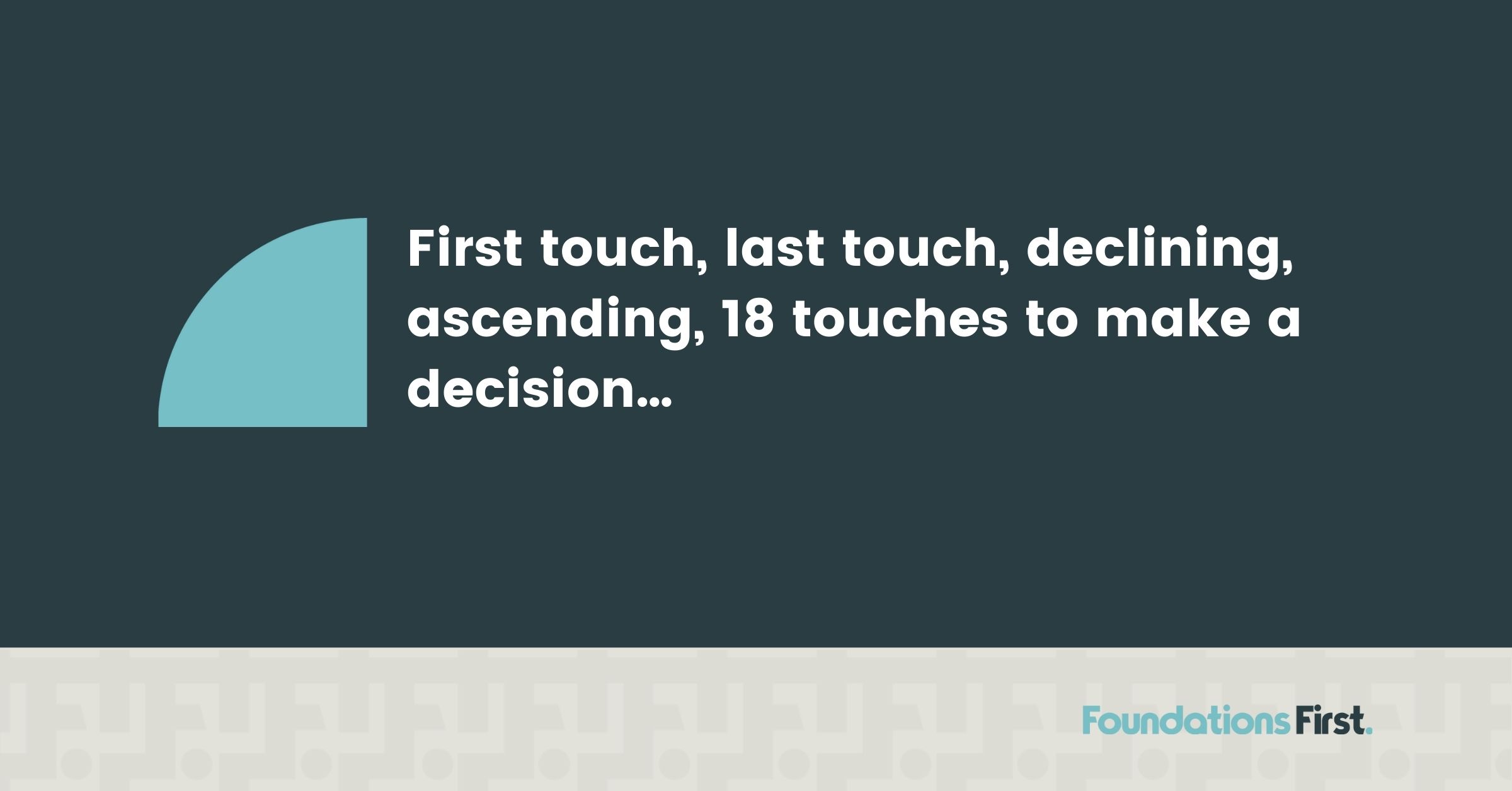The Myth of Marketing Attribution

Everyone has their opinion on B2B marketing attribution.
When it comes to B2B attribution, it seems like everyone has their curves. First touch, last touch, declining, ascending, 18 touches to make a decision… There’s so much noise, so much BS.
With all the touch points out there, how can marketers really assess the effectiveness of their campaigns and channels?
Stas Balanevsky, a Certified EOS Implementer® and me, Michelle Tresemer, sat down to discuss what makes these touch points so, well, touchy.
Understand what matters as part of your marketing strategy.
Most of the time when I see marketing teams trying to get attribution it’s because someone above them is asking for something ridiculous.
Usually the founder, the COO, or the VP of sales and marketing are completely unaware of the reality of how many touch points it takes for conversions. It can be impossible to track big-ticket items such as a $150,000 software package that takes six months to a year to close.
Touch points are often the focal point for leadership when they shouldn’t be. Rather than seeing that sales are closing and revenue is going up, leadership tends to dwell on touch points instead. That’s a problem.
While recently working with a client, we anticipated their organic traffic was going to tank due to some very important changes. Three months later, the client called freaking out because their founder was pissed. The founder was only looking at the organic traffic. What they didn’t look at was the revenue. The revenue nearly doubled because they had high-quality traffic coming in thanks to eliminating the junk traffic.
Leadership cannot trust touch points alone. Focusing on one thing, such as a dip in organic traffic, is a mistake. What matters is what works.
Check out the full conversation here in the video or read the transcript below.
Transcript:
So let’s talk about B2B attribution for a second these days. Right. But I mean, everyone has their curves, right? First touch, last touch, declining, ascending, 18 touches to make a decision, right. So much noise, so much BS.
Like where do you stand on the whole. Like just all of marketing, loosen the pickle jar, and then like the one Instagram post it’s like pop, there we go.
Most of the time when I see marketing teams trying to get attribution it’s because someone above them is asking for something ridiculous.
So if we educate the founder, the COO, the sometimes CMO even, or VP of sales and marketing, educate them on the reality of how many touch points it takes. For like these big ticket items, you know, a hundred thousand, $150,000 software package that takes six months to a year to close. You can’t track over that far.
Right? Like you can do your best. Obviously. They’ll see a bunch of LinkedIn posts from leadership. They’re going to see webinars. They’ll go to some conferences, downloads of eBooks. But the important thing is that they close at the end at some point, but I don’t want to waste my time trying to prove that I’m doing my job as a marketer, which comes back to KPIs. If the revenue is going up, I’m doing my job like as a CMO. Right. But if you want to fire me because, and I’ve seen this happen, founders get upset when organic traffic tanks.
Because Google just push another update or it’s a good thing. This is the problem. When people start getting too detailed in what the founder sees. I had a client very recently. I warned them and I said, hey, we’re going to make some changes. This is for the better. Your organic traffic is going to tank. Three months later, they called freaking out.
The founder’s pissed off. The organic traffic is way down. I said, great. We knew this was going to happen. Go look at your revenue. It was almost double because we got rid of the junk traffic and now it’s only high quality stuff coming in and it’s resonating more. Do you see what I mean? But if you try to, yeah.
I want to keep KPI’s and all that stuff high enough level, you can hire and fire on it. If I got fired, because organic traffic dipped, that’s a bad move because it worked, we got more revenue. I like it, it’s tricky. It’s very tricky because it’s all about expectation setting. And then the gentle reminder of I told you, so yes.

Michelle Tresemer
Categories
- Analytics and Measurement
- Brand Messaging
- Competitor Analysis
- Content Marketing
- Digital Marketing Strategy
- Digital PR & Events
- Marketing Budgets
- Marketing KPIs
- Marketing News
- Marketing Rock Samples
- Marketing Staffing & Vendors
- Marketing Strategy
- Marketing Tech Stack
- Podcast
- Product Marketing
- Sales Marketing Alignment
- SEO
- Social Media
- Strategic Marketing Partnerships
- Target Markets
- Uncategorized
- Vision & Purpose
- Webmaster








